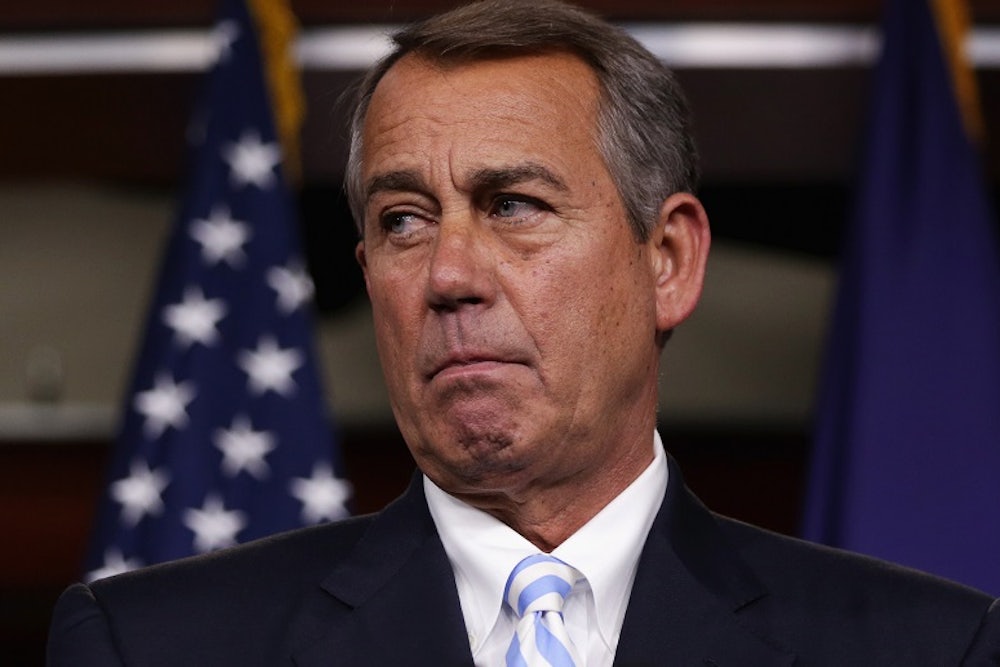How many times have Republicans blocked Democratic legislation during the Obama presidency under the guise of concern about the long-term debt? Too many to count. This tactic has reduced growth and inhibited a stronger economic recovery, but what makes it especially cynical is that Republicans don’t care about the deficit or the debt. Their voting records prove it.
Yes, the GOP plays lip service to the deficit, and a few GOP legislators—like Senator Tom Coburn and Representative Justin Amash—are actually committed to deficit reduction. But most congressional Republicans, particularly those in the House, have no problem with voting for legislation that increases the deficit. In fact, since January 1 of this year they’ve passed a number of different bills that increase the long-term debt by nearly $800 billion (nearly a trillion dollars if you factor in interest costs). To put that in perspective, the federal government spent $850 billion on Medicare and Medicaid combined in 2013.
Here are five deficit-increasing policies that the House GOP has passed:
Tax Extenders, $534 billion
These are tax breaks, mainly for businesses, that expired at the end of 2013. Congress has typically extended them each year, but legislators on both sides of the aisle have sought a permanent solution. In the Senate, Democrats have proposed making nearly all 50 of the expired tax breaks permanent without a spending offset. House Republicans, meanwhile, have proposed much the same for many of these tax breaks. For instance, the House GOP voted to expand an R&D tax credit that will add $156 billion to the deficit over the next ten years. Another one, a tax break for bonus depreciation, would cost $287 billion. Thus far, the House has already voted to extend and/or expand tax extenders at a ten-year cost of $534 billion. They are scheduled to take up two more in the fall that would bring that to more than $600 billion.
Child Tax Credit, $115 billion
House Republicans passed an expansion of the child tax credit last week that would allow more upper-middle income families to collect the credit. It would not, however, address expiring provisions of the CTC that would significantly hurt low-income families starting in 2018. The bill also indexes the credit to inflation. It would increase the deficit by $115 billion over the next ten years.
Higher Education Tax Credits, $97 billion
In July, the House passed a bill that would combine and expand four existing tax breaks for college expenses. The new provision—called the American Opportunity Tax Credit—would increase the deficit by $97 billion.
Doc Fix, $20 billion
Both the House and Senate passed, and President Barack Obama signed, legislation at the end of March to stave off a 24 percent cut to physician reimbursement rates under Medicare. To be fair to most House Republicans, they never actually received a real chance to vote for the bill. House GOP leaders, with the tacit approval of House Democratic leaders, called a very quick voice vote when few legislators were present in the chamber. Many on the right were furious at Speaker John Boehner for this move. This “doc fix” as it is called is only a short-term patch at a cost of $20 billion.
Highway Trust Fund, $8 billion
Last week, Congress avoided a funding gap in the Highway Trust Fund, which funds infrastructure projects, by passing a short-term patch that uses a budget gimmick as a spending offset. The gimmick, known as pension smoothing, doesn’t actually save any money in the long-term. In fact, it could cost the federal government money.
Senate Democrats sent legislation to the House that replaced pension smoothing with legitimate spending offsets. But House Republicans stripped those measures and opted for the budget gimmick instead. That costs $8 billion and Congress will have to address yet another shortage in the Highway Trust Fund next spring.

The point of this is not to say that deficit spending is wrong. But it’s outrageous for House Republicans to fight Democratic priorities under the guise of fiscal prudence and then abandon that principle whenever they feel like it. Either Republicans care about the debt or they don’t. They can’t have it both ways.
